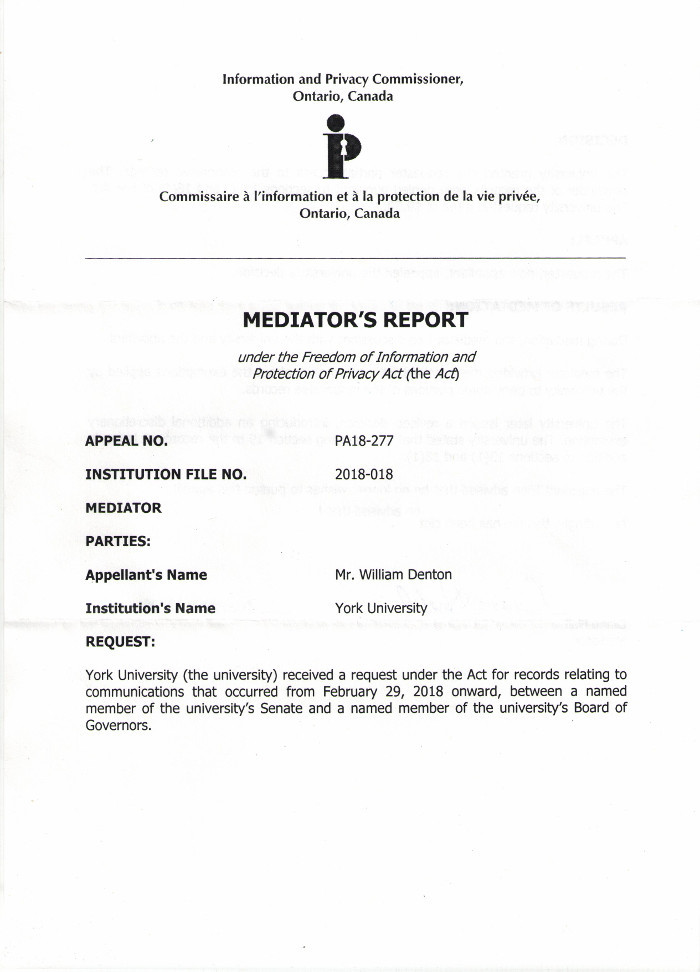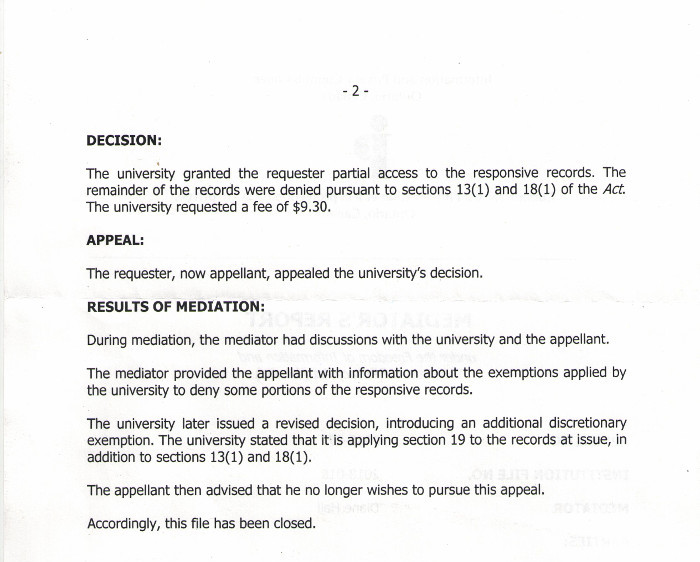In May, in Letters from the chair of the Board of Governors to the chair of Senate, I wrote about my request, under Ontario’s Freedom of Information and Protection of Privacy (FIPPA), for the release of a letter written by the (now former) chair of the Board of Governors of York University (where I work) to the (also now former) chair of the Senate (on which I sit). The letter was released with some redactions.
I wanted to see the whole thing, and the exemptions cited—the reasons given for the redactions—didn’t seem valid, so I filed an appeal with the Information and Privacy Commissioner of Ontario. A mediator got in touch with me and with York, and asked York to reconsider their opinion.
A few weeks later, York replied. They had added another exemption! This is allowed, and they were within the time limit. I suspect they realized their first two exemptions wouldn’t hold up and that they’d better add something more solid. This time they were citing section 19:
Solicitor-client privilege
19 A head may refuse to disclose a record,
(a) that is subject to solicitor-client privilege;
(b) that was prepared by or for Crown counsel for use in giving legal advice or in contemplation of or for use in litigation; or
(c) that was prepared by or for counsel employed or retained by an educational institution or a hospital for use in giving legal advice or in contemplation of or for use in litigation.
The mediator told me that this was valid. If someone seeks legal advice then they don’t have to disclose either the nature of the advice sought or what the advice was. York had talked to a lawyer, clearly (I don’t know if that’s inside counsel or someone outside), and they don’t have to reveal anything about that.
I’d hit a dead end, so I dropped the appeal.
The mediator was very, very helpful, and I enjoyed my conversations with her very much. (She did everything with me by phone, which was maximally efficient.) I learned a lot about the process and about what the IPC does. I knew they did good work but now I can speak from experience: these are experts and they want to help people.
This is what the mediator sent to close the appeal:


REQUEST:
York University (the university) received a request under the Act for records relating to communications that occurred from February 29, 2018 onward, between a named member of the university’s Senate and a named member of the university’s Board of Governors.
DECISION:
The university granted the requester partial access to the responsive records. The remainder of the records were denied pursuant to sections 13(1) and 18(1) of the Act. The university requested a fee of $9.30.
APPEAL:
The requester, now appellant, appealed the university’s decision.
RESULTS OF MEDIATION:
During mediation, the mediator had discussions with the university and the appellant.
The mediator provided the appellant with information about the exemptions applied by the university to deny some portions of the responsive records.
The university later issued a revised decision, introducing an additional discretionary exemption. The university stated that it is applying section 19 to the records at issue, in addition to sections 13(1) and 18(1).
The appellant then advised that he no longer wishes to pursue this appeal.
Accordingly, this file has been closed.
The York administration and counsel is within their rights to withhold the redacted text from the letter, but it’s a great example of an institution using the letter of the law to avoid living up to its spirit. The strike is over, the academic disruption is over, everything that was in question is in the past, and besides, written communications from the chair of the Board of Governors to the chair of Senate (a communication shown to members of the Senate Executive Committee, which has about a dozen people on it) should not be secret.
However, we’re not going to see it, so that’s that. Many things about how York works and is governed are open and transparent, but not as much as should be, and we will need to continue to push that.
 Miskatonic University Press
Miskatonic University Press